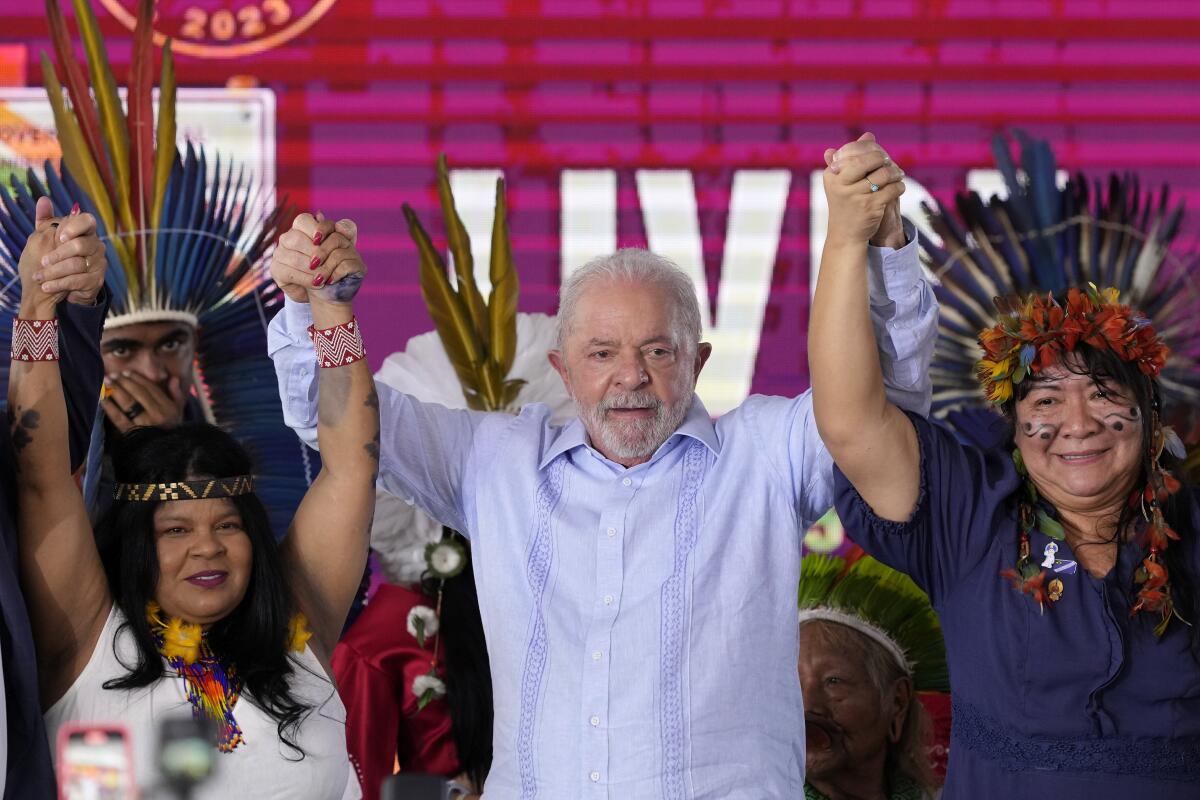Bold social reforms may not shore up Latin America’s beleaguered democracies

- Share via
Threats to democracy in Latin America are nothing new. The emergence of authoritarian populism in the region has eroded democratic norms and institutions, and illiberal politicians seeking to bolster their power have only hastened their decline.
But more worrisome is the spread of such behavior to at-risk democracies. Even in countries with strong institutions, recently elected left-of-center governments have struggled to execute their agendas. All signs point to an alarming rise in antidemocratic sentiment, and an examination of recent political developments (excluding the exceedingly complex case of Mexico) suggests that challenges to democratic governance will likely intensify.
Not surprisingly, Latin America’s dictators have embraced increasingly repressive tactics. Ahead of next year’s elections, Venezuelan President Nicolás Maduro has effectively reshuffled the country’s electoral council: After the mass resignation of officials linked to the ruling party, a committee featuring Maduro’s wife, Cilia Flores, will select the council’s new members. His government also disqualified opposition leader María Corina Machado from running for president.
In Nicaragua, President Daniel Ortega has disregarded a resolution from the Organization of American States urging the country to cease human-rights violations, release political prisoners, and respect religious freedoms (his regime has carried out a years-long crackdown on the Catholic Church). While this continued slide into autocracy is not new, it has heralded the weakening of democracy across the region.
In “flawed” democratic regimes, such as Guatemala, Honduras, and El Salvador, things have taken a turn for the worse. Several opposition candidates were banned ahead of Guatemala’s presidential election in June, and a court later postponed the official publication of the first-round results. Honduran President Xiomara Castro has adopted neighboring El Salvador’s hard-line antigang tactics, including the mass detention of alleged gang members and the suspension of some constitutional rights. Most troubling is President Nayib Bukele’s decision to run for reelection in El Salvador, in clear violation of the country’s constitution.
Likewise, Peru’s political dysfunction drags on. After a bungled coup attempt last year, former President Pedro Castillo was jailed, along with other former Peruvian presidents, and is awaiting trial. Dina Boluarte, Castillo’s vice president, was sworn into office and initially called for early elections, but recently announced that she will remain in power until 2026. The United Nations has condemned her government’s deadly repression of demonstrators early this year.
Most troubling are the difficulties facing relatively new governments in Brazil, Chile and Colombia, which came to power with a desire to carry out bold social reforms, a strong commitment to democratic rule and respect for fiscal rigor.
Brazilian President Luiz Inácio Lula da Silva, in particular, has struggled to pass his economic and social agenda through a hostile and divided Congress. This is partly because of the crisis in January, when former President Jair Bolsonaro’s four-year term — a far-right nightmare — culminated in the storming of government buildings in Brasília by his supporters. Revelations of high-level military complicity in the insurrection are emerging, and Brazil’s electoral court has banned Bolsonaro from seeking office until 2030 because of false claims he made about the voting system in the months before the election. Perversely, the longer the government appears gridlocked, the greater the chance that extremist forces will regroup behind another antidemocratic candidate.
In Chile, where the president is limited to a single four-year term, President Gabriel Boric is beginning to look like a lame duck. Although a new constitution will most likely be approved in a referendum by the end of the year (the first draft was rejected in 2022), Boric’s administration has been marred by electoral defeats, Congress’s rejection of his tax reform, a corruption scandal in the housing ministry, and an uneven — albeit principled — approach to foreign affairs. This creates an opening for another far-right populist, José Antonio Kast, who lost to Boric in 2021 but is currently leading the polls, partly because a law-and-order hysteria has gripped one of Latin America’s safest countries.
The situation in Colombia is similar: A promising left-wing president, with an ostensible majority in Congress and plans to pursue tax, healthcare, pension, and labor reforms, suddenly finds himself paralyzed, attacked from all sides and with scant support in Congress. While there does not appear to be an antidemocratic drift in Colombia, President Gustavo Petro’s insistence on taking his agenda to the streets may well unleash an authoritarian response from the country’s conservatives. In a traditionally conservative society, that could prove to be a majority.
In Argentina, presidential elections will be held in October, with primaries on Aug. 13. Several of the important candidates are worrisome. Libertarian Javier Milei, an eccentric, radical economist who wants to abolish the central bank and dollarize the economy, is attempting to break the Peronist lock on the presidency and could make it to a run-off.
For years now, polls have shown diminishing support for democratic rule in Latin America. Fragile economic conditions, new post-pandemic social demands, and polarized, distrustful electorates are fueling a politics of backlash that is likely to intensify threats to democracy in the region in the coming years.
Jorge G. Castañeda, a former foreign minister of Mexico, is a professor at New York University and the author, most recently, of “America Through Foreign Eyes.”
More to Read
A cure for the common opinion
Get thought-provoking perspectives with our weekly newsletter.
You may occasionally receive promotional content from the Los Angeles Times.






